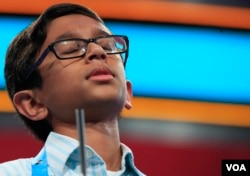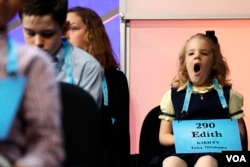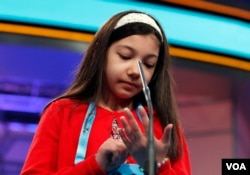Student Union
Indian-Americans Dominate the Spelling Bee, Again
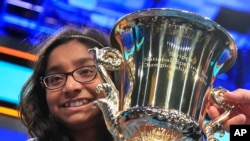
The 12-year-old from Fresno, California, showed little emotion and needed little time as she correctly spelled word after word. Sometimes she would ask the official bee pronouncer, Jacques Bailly, all the important questions, such as “Part of speech?” and ″Language of origin?” Sometimes, though, she did not even do that.
Ananya seized her chance at victory when her only remaining opponent, Rohan Rajeev, misspelled a word. It was a simple-looking but rarely used Scandinavian word, “marram,” a beach grass.
Ananya then calmly spelled two words in a row. Her winning word was “marocain,” a clothing fabric.
“I knew them all,” Ananya later said.
Ananya hardly smiled, even when her parents and younger brother hurried onto the stage to hug her as colorful confetti fell. She took time to comfort Rohan, who remained in his seat, rubbing tears from his eyes.
“It’s like a dream come true,” Ananya said. “I’m so happy right now.”
She will take home more than $40,000 in cash and prizes.
Ananya is the 13th Indian-American in a row to win the bee. Like her predecessors, she prepared by taking part in highly competitive bees that are limited to Indian-Americans.
Bee Background
More than 290 spellers traveled to Washington earlier this week to take part in the Scripps National Spelling Bee. They qualified for the event by winning their regional or local spelling competitions.
Most of the competitors are in middle school. This year’s oldest competitor was 15. The youngest speller, Edith Fuller, just turned 6. Bee organizers said they believe she is the youngest person ever to qualify for the national spelling bee.
After qualifying in March when she was 5, Edith became famous nationwide. On Wednesday, in between rounds of competition, she held her own press conference.
"Edith, how does it feel to be the youngest speller in history?"
"It feels really exciting."
"Do you hope to come back to the bee next year?"
"I do, if I don’t win this time."
After her press conference, Edith correctly spelled “tapas” in the third round. But, her score on a written vocabulary test was not high enough to move her forward to the final on Thursday.
Preparing for the Bee
All bee words come from the more than 490,000 entries in Webster’s Third New International Dictionary.
Bee qualifiers study for many hours each day. They learn language patterns and the roots of words. A root is the foundation for other words.
Successful spellers know much about Latin, French, Greek and Sanskrit roots and rules. In the finals Thursday, spellers faced words including “choucroute” and “tulsi.” “Choucroute" is a French word for pickled cabbage. “Tulsi” is a kind of herb. That word entered the Hindi language from Sanskrit.
While some of this year’s bee words were recognizable to the average American, most were not. Almost all entered English from other languages. But a few -– McMansion, shopaholic and webisode –- were words new in American popular culture.
A few were even trademarked names, like “Klydonograph.” That name for an instrument that makes a photographic record of power surges stumped competitor Erin Howard in the final rounds. Klydonograph has no known roots or language of origin.
Last year’s winners
Nihar Janga was 11 years old when he tied with then-13-year-old Jairam Hathwar at the 2016 National Spelling Bee. The dazzling duo correctly spelled all the words they were given for 25 rounds, then judges finally declared them co-winners of the bee.
Winners are not permitted to compete again in following years, but both Nihar and Jairam came to Washington this year to watch.
“It was very packed at the beginning with a lot of media tours and events and meeting a lot of people," Jairam said. "After that it started to die down.”
Last was was the third bee in a row with two co-champions. This year, bee organizers added a tiebreaker test to make that outcome less likely.
The Bee’s final day
Melodie Loya is 12 years old. She is a small, quiet girl from New York. She was one of the 40 spellers who made it to the final rounds on Thursday.
Melodie, who is home-schooled, said she studied up to four hours each day to prepare for the national bee.
“I like with spelling that every word is made of roots, so certain languages are spelled a certain way and I think that’s really cool.”
She covered the walls of her bedroom with the words she misspelled while preparing.
Melodie made it to the sixth round of competition. Fewer than 30 spellers remained. Then, the bee’s pronouncer, Bailly, asked her to spell the word "subauditur."
Melodie took her time. She asked Bailly all the permitted questions: language of origin, definition, part of speech, and alternate pronunciations.
Then, she began to spell.
“S-U-B-A-U-D-I-T-
She paused before continuing.
“-O-R.”
A bell rang, signifying the spelling was incorrect. Melodie said “thank you” and walked off the stage to the area where competitors who have lost wait for their parents. Television cameras capture it all up close. Melodie’s eyes filled with tears as she hugged her mother.
Rohan Sachdev, 14, was the next speller up after Melodie’s dismissal. It was his second time competing at nationals. But he said it was his third year to attend the event.
“I was here in the sixth grade, and then last year my brother beat me in the county and so I still came here…I still knew much more than my brother, it’s just I got a tougher word than him. But he’s a pretty good speller, too.”
Sachdev easily made it through round six, and then round seven and eight. And by Thursday afternoon, he was one of 15 spellers left. He finished Thursday night in a tie for 12th place.
The American sports network ESPN carried the final spelling rounds live, just as they do with major sports events. The hashtag #SpellingBee trended on social media.
ESPN’s bee experts had not predicted Ananya Vinay’s win. They favored Texan Shourav Dasari as victor. He was one of four spellers remaining Thursday night when he got the word “Mogollon.”
Without asking Bailly for any information about the word, Shourav spelled "Mogollon" (an ancient civilization in southern North America) in just six seconds. He then returned to his seat before officials even announced he was right.
Social media users said the moment was "more exciting than anything in the NBA finals" -- the final round of the National Basketball Association championship, which was broadcast live on another network at the same time as the National Spelling Bee.
Later, though, Shourav misspelled “struldbrug,” a type of immortal creature Jonathan Swift invented in his novel Gulliver’s Travels. It has no recognizable roots or language patterns.
The bell rang, signaling the end of Shourav's final year of bee eligibility.
“I was honestly, absolutely shocked. It was stunning,” former speller Jacob Williamson said. “Shourav is one of the greatest spellers of all time, and he’s probably the best speller that never won."
AP contributed to this report.
Please leave a comment here, and visit us on Facebook, Twitter, Instagram and LinkedIn, thanks!
See all News Updates of the Day
International students navigate financial challenges to pay US tuition
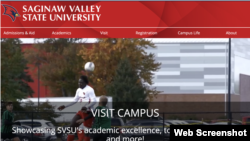
Navigating the complexities of higher education is challenging for many, but for international students, the financial hurdles can be particularly daunting.
Faced with skyrocketing tuition and fees, limited access to financial aid, and the instability of scholarships, many international students struggle to sustain their academic dreams.
Funding problems can lead some students to withdraw their college applications, as Alpha Daramy Sesay of Sierra Leone did. He abandoned his dream of studying journalism at the University of Maryland.
"I've applied to almost three universities in the past two years, and the board members were thrilled with my purpose statement and approved my application unambiguously," Sesay told VOA News. "However, I was unable to register due to the funding bottleneck, and the deadline for these offers has just lapsed."
Sesay had meticulously planned his move to the U.S., even stopping his scholarship search when a family member promised financial support. When Sesay was admitted to his dream school, however, the family support fell through, leaving him scrambling for scholarships that didn't cover all expenses.
Reflecting on his ordeal, Sesay advises future international students to seek scholarships and consult with school advisers early to avoid similar setbacks.
Talia Popovski, senior director of International Student Services at Valencia College in Orlando, Florida, suggests starting at a community college to save on tuition costs.
"Primarily, we have international students pursuing associate degrees," she said. "This is a major way for them to save money compared to going directly to a university."
Popovski emphasized the benefits of community colleges as pathways to universities, with many international students pursuing associate degrees before transferring to earn their bachelor's degrees. She also highlighted the role of on-campus work in alleviating financial burdens, suggesting institutional work-study programs as options.
According to NAFSA: Association of International Educators, a nonprofit dedicated to international education and exchange, international students are ineligible for federal work-study positions, necessitating discussions with advisers about employment eligibility. Popovski also mentioned that universities offer part-time jobs through their human resources departments, including paid internships, which provide additional financial support for education.
Student secures honor scholarship
Guilherme Lucas Mannarino, who received his associate degree from Valencia College, turned down 32 esports scholarships to study in Florida.
"I came to the United States [from Brazil] when I was 18 years old," Mannarino recalled. "I rejected all the scholarships that I acquired through esports, playing Fortnite."
Mannarino, who majored in finance at Valencia College, exemplified proactive planning in overcoming financial challenges.
Despite declining the esports scholarships, Mannarino secured an honor scholarship at Valencia College covering 50% of his tuition. He attributed his financial stability to planning ahead, staying on top of his academics, and acquiring an on-campus job.
To supplement his income, he conducted workshops advising Brazilian students on esports scholarships, allowing him to cover living expenses by finding roommates through social media.
"I was able to find a roommate on social media before coming to the U.S., which is a great way to save money," he said. "A year later, we had another roommate, which made my living costs cheaper, which is honestly the best way to save money in the U.S."
Tips for overcoming financial hurdles
Kadiatou Sow, from Conakry, Guinea, is studying at Saginaw Valley State University in University Center, Michigan.
"Managing the high cost of tuition and living expenses while studying abroad involves a strategic approach," Sow said. "I prioritize securing scholarships and grants tailored for international students to alleviate tuition expenses and sometimes cover living costs. Supplementing this with part-time work both on campus and in the local community provides a steady income for daily necessities."
She encourages fellow international students to balance work and studies effectively, understand visa work-hour regulations, and seek university support for financial aid options.
"Seeking guidance from university support services and staying informed about financial aid options are essential strategies for navigating these challenges successfully," Sow said.
Three ways international students can overcome financial hurdles:
1. Community college enrollment: Begin with an associate degree at a community college to save significantly on tuition costs before transferring to a university for a bachelor's degree.
2. On-campus employment: Explore institutional work-study programs and university job boards for part-time employment opportunities that complement studies and provide financial support.
3. Proactive financial planning: Save money before arriving in the U.S., seek scholarships tailored for international students, and explore paid internship opportunities to supplement income.
While financial obstacles are daunting, international students can achieve their academic aspirations through strategic planning, diligent scholarship pursuit and leveraging on-campus resources, advisers say.
By adopting proactive financial strategies and staying resilient, they can successfully navigate the challenges of financing their education abroad, ensuring a path to academic success and personal growth.
- By VOA News
Indian newspaper offers tips for US-bound students

Telangana Today, a newspaper in India, offers a list of tips and resources for students planning to study in the United States.
Among them:
- Prepare for your travel to the U.S., making sure to gather all necessary documents, including your passport and visa.
- Be sure to attend orientations.
- By VOA News
Michigan State international students get their own space

Michigan State University in East Lansing, Michigan, is setting aside a space in the International Center for international students.
Nidal Dajani, vice president of the school's International Student Association, said that the club plans to use the space to host events and hopes to collaborate with other student groups.
- By Dylan Ebs
International students find community during Pride Month

For LGBTQ+ international students, Pride Month, observed in June, is a unique time to reflect.
They hold on to multiple identities — both their LGBTQ+ identity and their cultural background — but coming to terms with them is not always easy.
For graduate student David Zhou, these identities can feel conflicting as transgender rights in China remain a controversial issue and spaces for LGBTQ people close. Zhou, 25, is transgender and pursuing an education in the STEM field at an urban university in the Midwestern United States.
VOA is using a pseudonym for Zhou’s first name and is not naming his university to protect his identity due to safety concerns back home in China. Zhou is not open about his transgender identity to his family.
During Pride Month, Zhou said he attended multiple LGBTQ+ events in his community and is surrounded by a supportive group of LGBTQ+ students who can relate to his experiences. But he’s not open about his identity to everyone on campus and said he doesn’t disclose his preferred pronouns to everyone to avoid transphobic comments.
“I feel like I have to make some judgments of the character of that person to see if they’re a good person to disclose [my identity] to,” Zhou said.
Zhou’s Pride Month celebrations included attending local markets with LGBTQ+ vendors and hanging out with his LGBTQ+ friends.
“They normalized being trans and for a long time I feel like trans identity is, should I say a vulnerability, brings me fear and worrying about discrimination, but having those events are helpful because it allowed me to see that queer people could just [live] openly,” he said.
At social events where few international students are present, Zhou said it can be tough to fit in.
“There's a lot of times like when they were talking about things I kind of, don't really understand, mostly because I kind of lack some background experience or knowledge,” he said.
Zhou said he is not aware of specific groups for LGBTQ+ international students at his university, but said international students are more prevalent in graduate programs and therefore find representation in organizations for LGBTQ+ graduate students.
In China, transgender individuals must obtain consent from an “immediate family member,” even for adults hoping to transition, which critics say limits the autonomy of transgender individuals while supporters say the policy protects doctors from violence by upset parents.
Struby Struble, a former coordinator of the University of Missouri LGBTQ+ Resource Center, told NAFSA: Association of International Educators in 2015 that LGBTQ+ international students face a “double barrier” on campus.
“With their international student friends, they feel isolated because they’re the LGBT one,” she said. “But then among the LGBT students on campus, they feel isolated because they’re the international one.”
Nick Martin, associate director of the Q Center, Binghamton University’s LGBTQ+ student support office, said when international students tour the center, there’s often a sense of hesitation as they enter a type of space that may not be present in their home country.
“I compare that to a year in after they've come into the space, they've again, maybe come to some of our events, they've got more connected,” he said.
Martin said graduate students have a unique interest in the Q Center as they may use the office for research and advocacy purposes that align with their studies.
“For older students, there may be hesitancy in a different way, but I think it's more in the vein of they want to do some of the advocacy work,” he said.
Martin said he thinks about how both his office and BU’s international student office can support students who come from countries with few — if any — protections for LGBTQ+ individuals.
“It's been a learning process of what those students really need, but I think I've kind of learned that a lot of students are just looking for the safe space that we offer,” Martin said.
- By VOA News
International students discuss US campus culture shock

International students at De Anza College in Cupertino, California, talked about culture shock in an article in La Voz News, the student newspaper.
"It felt like a major culture shock. Everything was so different, from academics to mannerism," said a student from Mexico.
Read the full story here.




